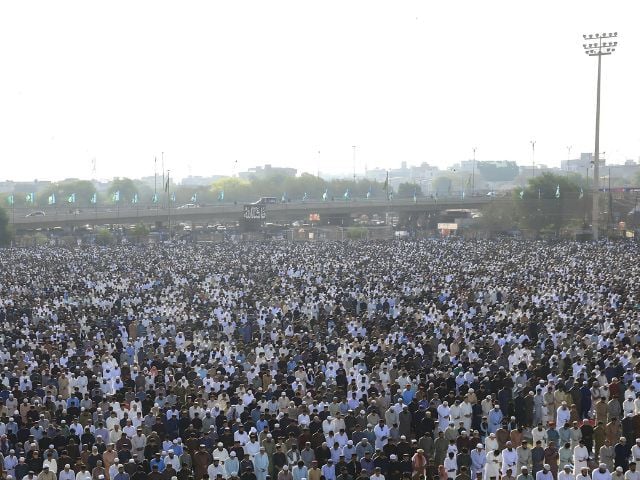Prime Minister Shehbaz Sharif has extended Eidul Fitr greetings to the people of Pakistan and leaders across the Muslim world on Monday, while stressing the need for unity, economic revival, and support for oppressed communities in Kashmir and Palestine.
In his message, the prime minister acknowledged the ongoing battle against terrorism and paid tribute to Pakistan’s armed forces. “Officers and jawans are sacrificing their lives for restoring law and order,” he said.
“Eid teaches us happiness, thankfulness, brotherhood and empathy,” Sharif noted, urging the nation to carry forward the spirit of Ramazan through patience, sacrifice, and adherence to Islamic values.
He warned of threats from “internal and external enemies” and called on the public to stay united against hatred, sectarianism, and extremism. “It is our collective responsibility to strengthen the economy, society, and national solidarity,” he said.
The prime minister also remembered the martyrs of the recent Jaffar Express attack and expressed solidarity with their families. He reaffirmed Pakistan’s unwavering support for the people of Indian Illegally Occupied Jammu and Kashmir and Palestine, urging the international community to act against human rights violations.
Sharif appealed to citizens to share Eid celebrations with the underprivileged and contribute to building a welfare society.
Diplomatic outreach
As part of his Eid diplomacy, Prime Minister Sharif held telephone calls with several Muslim leaders.
He spoke with Kuwait’s Crown Prince Sheikh Sabah Al-Khaled Al-Hamad Al-Sabah, conveying greetings to him and the Kuwaiti leadership.
Sharif reaffirmed Pakistan’s intent to deepen cooperation, recalling their meeting at the UN General Assembly in New York last year.
He also spoke with Turkish President Recep Tayyip Erdogan and expressed satisfaction with the positive momentum in bilateral relations.
Erdogan reciprocated the Eid greetings and reiterated Turkiye’s support for Pakistan on key issues.
Later, Sharif phoned Jordan’s King Abdullah II to extend Eid wishes and discuss the situation in Gaza. The king thanked Pakistan for its humanitarian support to Palestinians and praised Islamabad’s consistent backing of the Palestinian cause.
Sharif expressed appreciation for Jordan’s peacemaking efforts and extended a formal invitation to King Abdullah to visit Pakistan, which was warmly reciprocated.
The prime minister also held similar exchanges with the presidents of Uzbekistan and Azerbaijan, underlining Pakistan’s commitment to strengthening ties across the Muslim world.
Moreover, Muslim leaders across the region marked Eid al-Fitr with public prayers and wide-ranging speeches on Monday, addressing both religious celebration and political themes.
In Iran, Leader of the Islamic Revolution Ayatollah Seyyed Ali Khamenei led Eid prayers at the Grand Mosalla Mosque in Tehran, where he also extended felicitations for Eid and the Persian New Year, Nowruz.
During his address, Khamenei praised the large nationwide turnout for International Quds Day, held annually in support of Palestinians. He delivered a sharp rebuke to Israel, calling it “the corrupt usurper Zionist regime” and describing it as a proxy force for colonial powers.
“If enemies commit evil, they will definitely receive a strong and reciprocal blow,” Khamenei said. “And if they seek to create sedition within the country, the nation itself will give a proper answer.”
Meanwhile, in Afghanistan, the Taliban’s reclusive supreme leader Hibatullah Akhundzada issued a rare public message for Eid, urging national unity and reconciliation.
He called the current moment a “golden opportunity” for Afghans to rally behind the country’s security forces, crediting them with maintaining peace since the Taliban’s return to power.
The message, shared in five languages on social media, notably avoided reference to recent attacks or the international criticism faced by the Taliban government, particularly over its restrictions on personal freedoms.
Instead, Akhundzada urged support for the Ministry for the Promotion of Virtue and Prevention of Vice, which enforces strict social codes.
Eidul Fitr marks the end of the fasting month of Ramadan and is celebrated by Muslims worldwide through communal prayers, charity, and gatherings. In Iran and Afghanistan, the occasion is deeply intertwined with both spiritual reflection and national discourse.

